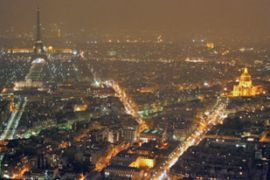The Intergovernmental Panel on Climate Change (IPCC) report said it was “very likely” that human activities were the main cause, this was up from the panel’s last report in 2001 which said it was just “likely”, or that there was a 66 per cent probability of a link between human activity and global warming.
Man’s affect on climate change has been disputed, with some critics arguing it is a natural phenomenon.
On Friday, the Guardian, a British newspaper, reported that the American Enterprise Institute (AEI), a think tank which receives funding from ExxonMobil, the US oil company, had offered scientists $10,000 for articles that emphasise undermine the IPCC report.
But Hans Joachim Schellnhuber, director of the Potsdam Institute for Climate Impact Research in Germany, said: “With this report, any last doubts should be dispelled … we have a responsibility to correct this dangerous development by drastically reducing greenhouse gas emissions.”
Hundreds of scientists and bureaucrats have been editing the new report, which had to be unanimously approved by its panel of 2,500 scientists from 130 countries.
While the language of the report is considered strong, it offers no recommendations.
Rising sea-levels
The report showed the Earth’s surface temperature is likely to rise between 1.8 degrees celsius to 4 degrees celsius, and sea levels will correspondingly go up 18cm to 29cm, by 2100.
The Gulf Stream is “very likely” to slow down, with projections suggesting an average slowdown of some 25 per cent this century and the report also predicts increasingly intense storms, heat waves and heavy rains in the decades to come.
Carbon emissions this century “will contribute to warming and sea-level rise for more than a millennium”, because of the length of time greenhouse gases take to degrade.
Greenland’s ice sheet will continue to contract beyond 2100 and will contribute to a rise in sea level around the world that would badly affect low-lying land.
Ainun Nishat, a representative of the International Union for Conservation of Nature in Bangladesh said: “Bangladesh will be one of the countries that would be the most seriously affected by global warming and sea rise … The impacts on Bangladesh would include increased level of drought, flooding and storms.”
“Lights out”
The report states that global warming “is now evident” from several sources. Over the past 100 years, from 1906 to 2005, global surface temperatures have risen by 0.74 degrees celsius.
In the northern hemisphere, temperatures were very probably higher over the second part of twentieth century than at any 50-year period in the last 500 years.
Mountain glaciers and snow cover have declined in both hemispheres, with sea levels rising globally by 1.8mm per year from 1961 to 2003 and this pace has accelerated to 3.1mm per year from 1993.
Since the 1970s droughts have been “more intense and longer” and observed over wider areas, while the ice caps are melting, with the top layers of the Arctic permafrost have warmed by up to 3.0 degrees celsius since the 1980s.
|
“We have a responsibility to correct this dangerous development by drastically reducing greenhouse gas emissions”
Hans Joachim Schellnhuber,
Potsdam Institute
|
Stephanie Tunmore, a Greenpeace climate and energy campaigner, said: “There is a clear message to governments here, and the window for action is narrowing fast. If the last IPCC report was a wake-up call, this one is a screaming siren.”
On Thursday night, in advance of the report’s release, the lights on Paris’ Eiffel Tower were turned off as part of a campaign to highlight the threat of global warming.
France’s Alliance for the Planet conservation group organised the five-minute long nationwide “lights-out”, which was also observed by the Hilton hotel where many of the conferences delegates are staying.
Several other European cities also staged symbolic blackouts.
